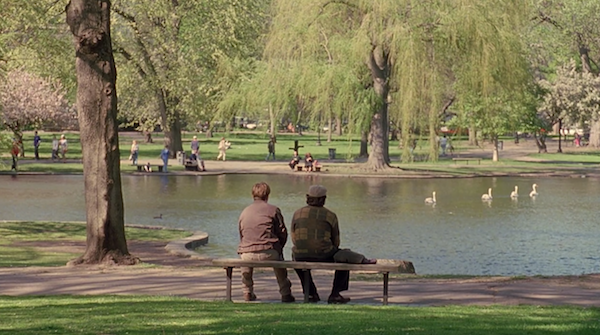
“You don’t know about real loss, ’cause that only occurs when you love something more than you love yourself. I doubt you’ve ever dared to love anybody that much.”
This is a quote from Robin William’s character Sean Maguire in the movie Good Will Hunting. It comes from a scene where therapist Sean Maguire sits down with Matt Damon’s Will Hunting in a peaceful park to open up about his deceased wife. This scene is particularly powerful, because it’s a scene where these two men are battling. But it’s not fought with fists or guns, but with words. As Sean Maguire, tries to help Will Hunting fight against the forces of toxic masculinity. But as important as this scene is, it is part of a greater narrative, and the true impact of this scene can only be understood when looking at the climax, and those painful three words, “It’s not your fault.”
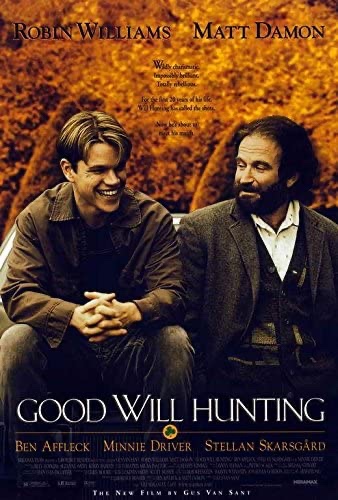
Directed by director Gus Van Sant, Good Will Hunting is a 1997 Drama starring Matt Damon. It is critically acclaimed and loved by critics. But maybe less understood, is the way in which it confronts toxic masculinity head on. Because in Good Will Hunting, the greatest antagonist that Will faces is toxic masculinity, and the idea he has to push down what he is good at in order to be a man.
Sean Illing once said in his article, “What we get wrong about misogyny”, “Misogyny, the way you define it, is something we practice almost unconsciously. We’re embedded in a culture and we internalize the customs and social mores that define that culture — and thus perpetuate it. We’re all implicated, even if we’re not aware of it.”
Throughout the movie Will’s idea of masculinity is very much unconscious. If you were to ask Will Hunting himself what toxic masculinity is, he would probably quote a definition he heard in a book, but he wouldn’t understand how it impacts himself and how it ruins him.
As Colleen Clemsns says in her article, “What We Mean When We Say, “Toxic Masculinity”, “But in a culture that equates masculinity with physical power, some men and boys will invariably feel like they are failing at “being a man.”
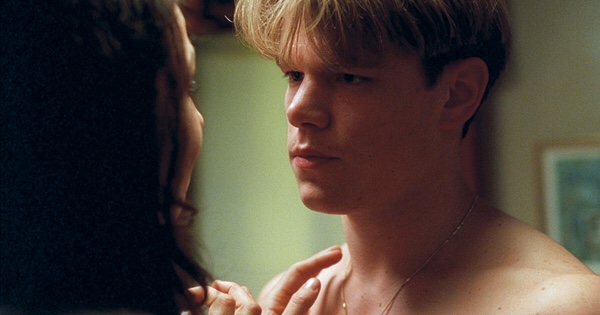
Throughout the movie, Will gets into fights with other people, hangs with his tough friends, all while secretly yearning for a life where he can embrace his full talents. He wins over Skyler, his love interest, with his wits, but still puts on the tough guy persona with her, all while being deeply insecure, not allowing himself to be vulnerable to her, which potentially destroys their relationship.
This is the lie Will Hunting believes, one he latches onto, and one Sean Maguire must beat in order to save Will. Will is fighting to keep his traditional masculine values, do not be vulnerable, keep others away, be a man. Sean is fighting to help him understand more healthy values, you should share your pain, and it is ok to cry. Throughout the movie, Sean makes progress with Will, and Will slowly begins to break this mindset. But there is one barrier Will has yet to overcome, his past. Will has never been allowed himself to confront his past, because he knows doing so will require confronting emotional pain, which is not the “manly” thing to do. As Randy Flood says in his essay, “Toxic Masculinity – The Hidden Trauma in Men’s Lives”, “It is erroneously believed that real men don’t burden others with their problems. They suck it up and deal with it on their own. In fact, the mark of “real man” is one who is heroic enough, tough enough, man enough to face and endure traumatic events unscathed.”
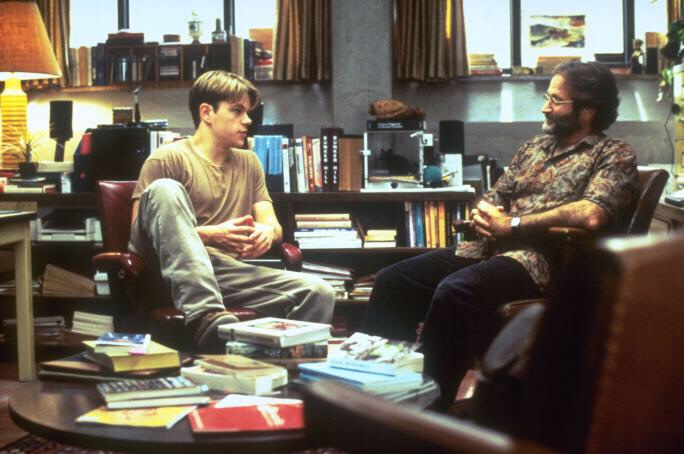
Will endures so much because that is what he is supposed to do. In many other movies, Will would have been rewarded for sucking it up and acting strong, maybe even called a hero. But that is why Good Will Hunting hits so close to home, because it is one of the few movies to address this fact.
So what is the reason Will, and by extension, Men in society, that prevents them from being able to cry? It has to do with the desire to keep men in control, and by extension power, and vulnerability is thought to take that away. As Pop Culture Detective in their video essay “Boys Don’t Cry (Except When They Do”, “The myth that vulnerability is synonymous with loss of control, and therefore incompatible with power, is so corrosive and strong that many men have come to believe they must kill their emotional sides in order to be useful members of society.”
This perfectly sums of the mindset of Will Hunting. Will believes he is more useful as a man working as a janitor than the countless other opportunities he would have if he just embraced his gifts, because that would involve self reflection, something a man is not allowed to do. Will’s mindset, the traditional masculine one, prevents him from succeeding in areas he should prosper in, which is why he needs Sean to break down those walls. The Patriarchy is not the standard Will should be held up to, and Sean knows that. Therefore, the only way for Will, and many other men, to reach their full potential, is to realize that their vulnerability does not make them any less of a man, it just makes them human.
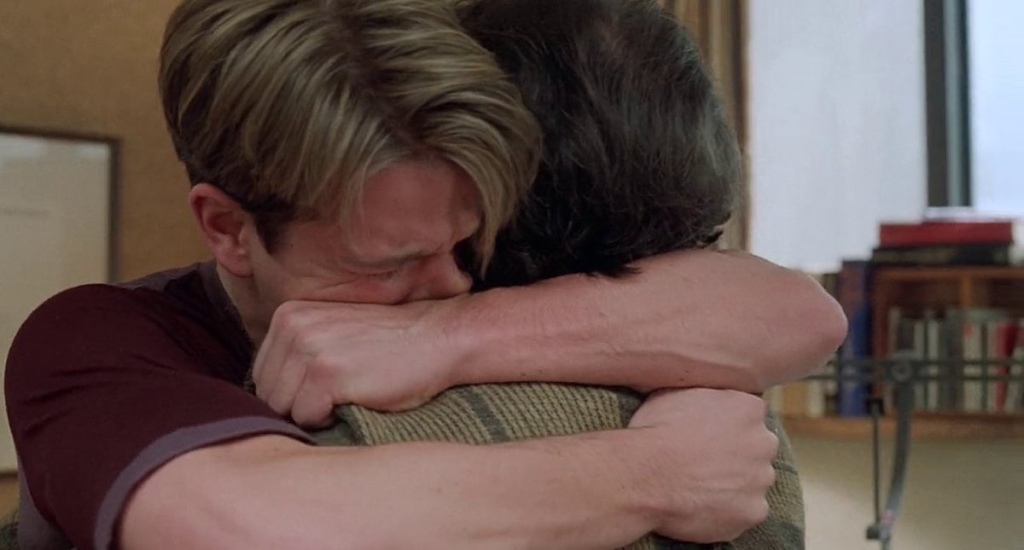
And this is the final piece of Good Will Hunting’s puzzle, the patriarchy, and by that extends, Fathers. Despite there being no conversation between any Father and son throughout the movie, Sean is very much a Father figure to Will. Will’s biological Father was abusive, beating him as a child, and very clearly never offered him emotional support. So Will decided to never let himself be hurt that way again, and closed himself up, believing, like many other men, emotions to lead to pain.
This is why Sean Maguire makes such an impact on him. Sean is very much Will’s Father figure in the movie, and as Ellen Hendrikson says in her article “How to Fight Toxic Masculinity”, “When a man rejects suffering in silence, he becomes a role model and paves the way for other men to get help and be healthy, especially those who need it most.”
When Will sees someone so open with his emotions, particularly genuine love and vulnerability for his wife, he internalizes that, because Sean has become his idea of a man. There’s a very telling line in the climax where, feeling himself start to cry and be vulnerable, Will says, “Don’t fuck with me Sean, not you.” Sean is the only man Will genuinely trusts, and this line shows Will’s deep insecurity with the people he loves. For a second, Will views Sean’s attempts to help as an attack, and Will can not handle being attacked again.
Many men are like Will in their belief that others encouraging them to ask for help is an attack. When traditional masculinity is so ingrained in the brains of men, they view any effort by others to help them, as demeaning. But eventually, Sean does break through, because in the end, Will needed to cry. Men may not be allowed to cry, but they want to very badly. Feeling pain is human and necessary, and when we share our pain with others and allow ourselves to be vulnerable, we can really love each other. And often, it is their Fathers who can be to permanently ingrain toxic masculinity into their children, or hopefully, be the ones to break the cycle, and let their children cry.
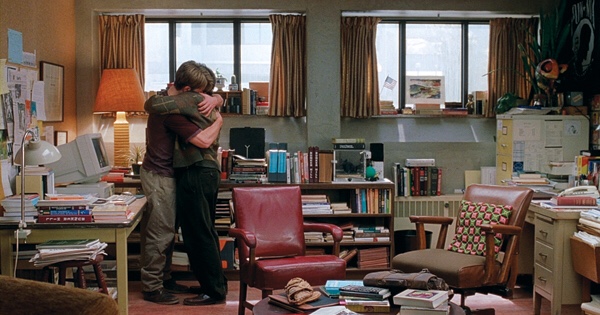
In conclusion Good Will Hunting deconstructs masculinity by showing us a character whose life has been ruined by it, and showing his growth through finding a much healthier mindset for men. The final scene is where it all comes together, where Will and Sean finally embrace, and Will can just be vulnerable. Will has found a man in his life who is actually a positive role model for him, and this allows him to break free of the chains traditional masculinity placed on him. Many coming of age stories open with a boy usually more prone to crying, and ends with them being a man who has shut out their emotions. Good Will Hunting starts with a tough masculine man, and ends with a someone allowed to cry and be vulnerable, and is still a man. And that is the story many men today should see.
Works Cited
https://www.learningforjustice.org/print/99849
https://sanfordhousegr.com/toxic-masculinity-hidden-trauma-mens-lives/